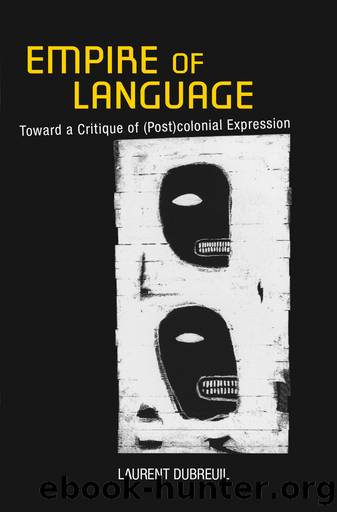Empire of Language by Dubreuil Laurent;Dubreuil Laurent.;Fieni David;

Author:Dubreuil, Laurent;Dubreuil, Laurent.;Fieni, David;
Language: eng
Format: epub
ISBN: 978-0-8014-6750-9
Publisher: Lightning Source Inc. (Tier 3)
Censure and the Unpublished
So there is censure. And (post)colonial hypercorrectness especially functions as the great prelude to the muting of the indigene, and to the deafness of the colonizer. Censure includes ordinary violence, especially in wartime: nonpublication, assassination. It also takes other, less direct paths. Think of Mouloud Feraoun, one of the first francophone writers from Algeria. His first novel, Le fils du pauvre (The Poor Man’s Son), will first have to be edited at the author’s own expense before being accepted by Seuil in 1954. The director of the Méditerranée collection, Emmanuel Roblès, will ask Feraoun to cut out the pages devoted to the Second World War. Killed in 1962 by the Organization of the Secret Army (OAS), Feraoun will thus experience the limits of the exterminating will of totalitarian colonialism, and this after having been denied authorial prerogative because of his position as a pioneer. Yet silencing may also occur in publication. The inside jacket cover, now modified in the current pocket edition, in effect delivered a warning (avertissement). From this short user’s manual for Feraoun’s reader, I extract this imperative report: “Not one line is imagined.” This is what signals the book’s infra-literariness. However, the first section of the novel opens with a chapter in italics, as if it represents an unfinished autobiographical manuscript by Feraoun. This superior voice, belonging to the one who is designated as the “narrator” (95) of all of Le fils du pauvre, subsequently takes over the testimony and tells the rest of the story. This device builds a narrative whose dynamic is that of fictional deviation. Feraoun, the autobiographical “I,” and the subjective narrator enter into a problematic relationship, which is everything, except for the transparent transcription Roblès announces. The avertissement should be understood as a cancellation of the literary value of the work before the fact. Colonial functionaries, ethnography, and even primary and secondary education all played a role in the production of texts by indigenes, from whom one required documents to verify their very existence. By rejecting the least picturesque section of the manuscript (after childhood in Kabylia and the difficult acclimatization of an adolescent in the colonial city), and then by denying that it was even a novel, Roblès would silence the writer who was among the first from his country to seize written French in order to speak beyond the injunction. This gesture is all the more violent since until quite recently the dominant linguistic model in modern France has been literary expression, both in school and in “polite society.” Trapped by its own dynamic, censure must finally expel the francophone author by recognizing nonliterary features in his text, that is, features that are ultimately dissimilar to the historical reality of the language.
The attitude of silencing and negation is especially evident in relation to pioneering texts. Yesterday’s interdictions can rejoin those of today. In a moment, we will demonstrate this point with Bakary Diallo’s Force-Bonté (Force-Goodness). This work is likely the first long narrative published in French by a black writer from colonial Africa.
Download
This site does not store any files on its server. We only index and link to content provided by other sites. Please contact the content providers to delete copyright contents if any and email us, we'll remove relevant links or contents immediately.
| Anthropology | Archaeology |
| Philosophy | Politics & Government |
| Social Sciences | Sociology |
| Women's Studies |
The remains of the day by Kazuo Ishiguro(7572)
Tools of Titans by Timothy Ferriss(6963)
The Black Swan by Nassim Nicholas Taleb(6202)
Inner Engineering: A Yogi's Guide to Joy by Sadhguru(5907)
Giovanni's Room by James Baldwin(5892)
The Way of Zen by Alan W. Watts(5809)
The Six Wives Of Henry VIII (WOMEN IN HISTORY) by Fraser Antonia(4797)
The Power of Now: A Guide to Spiritual Enlightenment by Eckhart Tolle(4766)
Astrophysics for People in a Hurry by Neil DeGrasse Tyson(4627)
Asking the Right Questions: A Guide to Critical Thinking by M. Neil Browne & Stuart M. Keeley(4597)
12 Rules for Life by Jordan B. Peterson(3744)
The Ethical Slut by Janet W. Hardy(3509)
Skin in the Game by Nassim Nicholas Taleb(3477)
Housekeeping by Marilynne Robinson(3419)
The Art of Happiness by The Dalai Lama(3390)
Double Down (Diary of a Wimpy Kid Book 11) by Jeff Kinney(3284)
Skin in the Game: Hidden Asymmetries in Daily Life by Nassim Nicholas Taleb(3271)
Walking by Henry David Thoreau(3236)
12 Rules for Life: An Antidote to Chaos by Jordan B. Peterson(3209)
